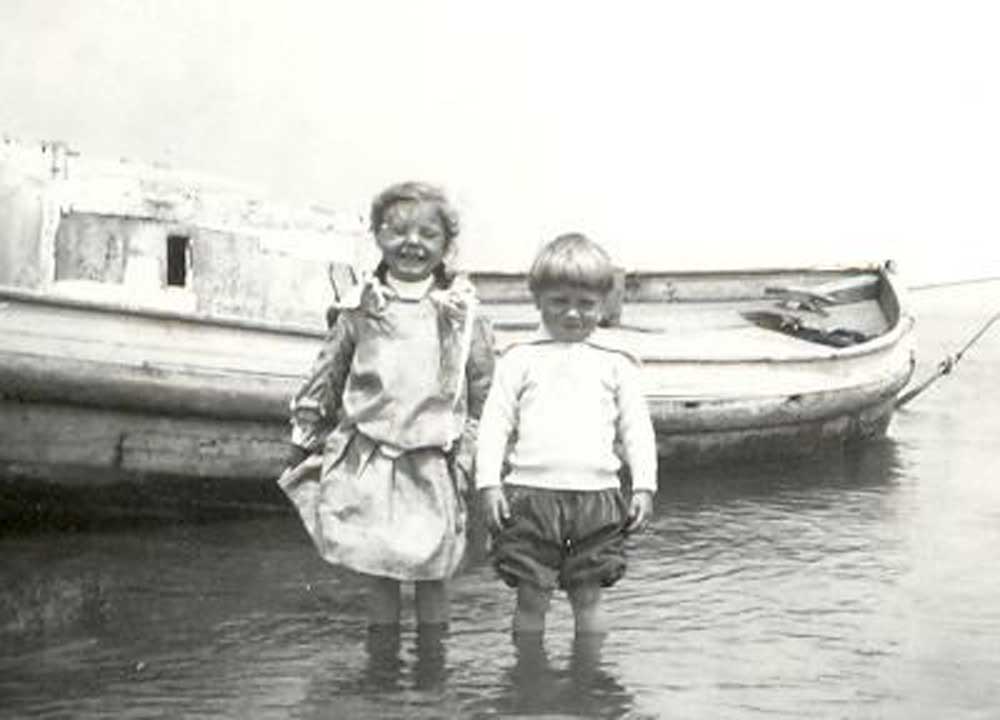Saints or Sinners? Characters of Pacific County: Cherished memories of a precocious little boy
Published 9:55 am Saturday, March 23, 2024

- At ages 5 and 4 respectively, Medora and Albert Espy liked nothing better than wading in Shoalwater Bay in front of their house in Oysterville.
Harry Albert Espy, Jr. Aug. 23, 1900 — Jan. 24, 1905
It’s hard to think of Albert as my uncle. He was my grandparents’ second child and oldest son, and he died long years before I (or even my mother and two others of her six siblings) was born. Too, I don’t think of him as a “Junior.” He was always referred to by his middle name, “Albert.” I wonder how he’d have signed his name had he lived to maturity.
Albert was born in East Oakland, California and was just past two when the family moved to Oysterville. Most of what I know of Albert is from the few paragraphs written by my grandmother many long years after his death — of stomach cancer it was thought. She jotted down her these lines for my uncle Willard who had hoped to write a book about growing up in Oysterville:
Albert was born talking or so it seemed. At fourteen months old he talked plainly and intelligently. There was nothing of special note in his short life except the indelible print that it left upon our hearts.
All of the Irish ancestry culminated in this precocious child. True blue eyes of haunting beauty — the only blue eyes in the family, and the only child with his father’s fair skin — a long upper lip and sensitive mouth, and stubborn straight fair hair that stood on end. ‘Happy Hooligan’ we called him.
The lovely old iron toy is one more reminder of the indelible mark that even one short life can carry forward to the future — a gift often overlooked as we try to make sense of our complicated and tumultuous history.
When less than two years old his uncle Ed and I had him on a street car and a Chinaman boarded. ‘What kind of a man do you call that?’ he astonished the passengers by asking.
At the same period, we had him at a zoo and he worried us by getting too near the cages so Papa took him in his arms, a baby figure in white coat and hood. We turned into an enclosed square where there was an elephant, and Albert exclaimed, ‘Well, I don’t know — that beast might hurt me!’ The bystanders lost interest in the elephant in amazement at the baby.
“Once when a little past two I asked him where he was going — ‘Going to call on Mrs. Wirt and God,’ he said. [Mrs. Wirt lived just across the lane and God, of course, lived in the church across the street.]
During his last illness we were watching children playing in the snow from the hospital window. I remarked that next winter he could play out with the boys, and he said, ‘Will they have snow in heaven?”
He had a marvelous head, the pride of his father’s life, and when he died Papa had a cast taken — a tragic and futile effort to hold beauty gone. We none of us have ever seen it — yes, Papa did see it once, at first.”
Albert’s fire engine still resides in the room where he played with it all those years ago — “the nursery” the room was called in those days when the seven Espy children were little. The lovely old iron toy is one more reminder of the indelible mark that even one short life can carry forward to the future — a gift often overlooked as we try to make sense of our complicated and tumultuous history.









